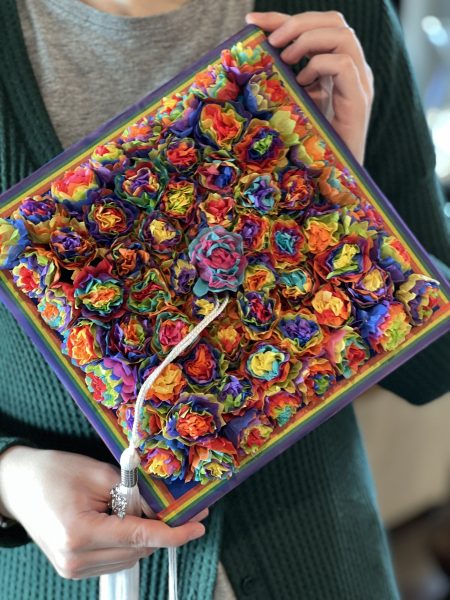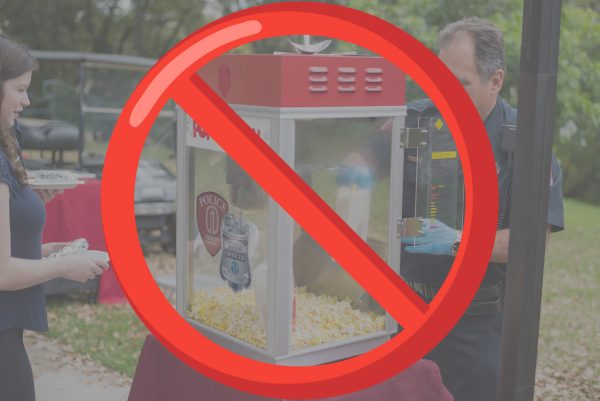The issue with “Keep the Christ in Christmas”
Christianity is about acceptance, judging non-believers only leads to division
We’re venturing further into the holiday season, and the signs are everywhere. Car commercials complete with giant bows on the hoods, bells added to every company’s jingle, and storefronts decked out with lights and “sales” meant to drain your pockets. It’s no surprise to anyone that Christmas is highly commercialized in America. Some Christians, however, fight against this with the phrase, “Keep Christ in Christmas.” I am not one of those Christians.
I recognize that might be controversial to say as if I’m not actually adhering to my faith. Let me be clear and say that Christ has not left my Christmas. I still go to church with my family on Christmas Eve, light the Advent candles and believe the “reason for the season” is Jesus’ birth and the hope that it brings into the world. But this is my Christmas. It’s not everyone’s.
A 2017 Pew Research Center survey found that 90% of Americans celebrate Christmas, but only 46% said they celebrate for a religious reason. So, if not the birth of Jesus Christ, what are non-Christians celebrating on Dec. 25?
Here is where we, as Christians, can go wrong. Especially those who act like they’ve been violently accosted when the Starbucks barista hands them their coffee with a “Happy Holidays” instead of “Merry Christmas.” Just because Jesus isn’t the reason for someone’s Christmas celebration doesn’t mean everything Jesus stands for is gone. Besides the capitalist takeover of Christmas gift-giving, Christmas is still a season of charity, love and gratitude. Whether we get these from the Bible or a secular holiday tradition like watching “The Polar Express” shouldn’t matter.
There are worse things happening in the world today than non-Christians celebrating Christmas, and frankly, the conservative Christian outrage over the loss of Christmas never seems to rear its head at actual issues like the epidemic of violence against Black transgender women or family separation at our southern border, to name a couple.
To a certain extent, I don’t care about the “Keep Christ in Christmas” discussion because it seems like such a non-issue. That is until I comprehend that fellow Christians truly think we’re losing Christmas as if we don’t still have a death grip on society.
There’s a false narrative of new-age Christian persecution, which includes believing gay marriage is a slight to religious freedom and that bans on in-person church during the pandemic aren’t to protect the health of congregations but instead to suppress Christian worship. The thought that we could somehow lose control over Christmas only feeds this narrative. It also reveals a toxic superiority complex: that somehow, only Christians can experience true happiness, hope and goodness. That these things can’t possibly be present during the holiday season for anyone else, and if they are, then they’re found in the wrong way. We may mask concern over a secularized Christmas as wanting everyone to be saved by believing in Jesus Christ instead of Santa Claus, but this is just judgment, and if there’s one thing all Christians should agree on, it’s that judgement is the wrong path to take.
A hyperfixation on supposed acts of persecution as small as atheists sitting around a tree with pretty lights keeps us from recognizing Christian complicity in past and present injustices. Western Christianity is responsible for a violent white savior complex that results in missionaries perpetuating a cycle of short-term aid without true biblical justice, sometimes at the expense of human lives. According to the Associated Press, Donald Trump’s tremendously un-Christian campaign for re-election just won over about 80 percent of white evangelical Christian voters. On a smaller yet important scale, public schools in America still don’t have days off for all non-Christian holidays, drawing a very firm line in the sand to separate normal from other, but please, let’s worry about losing our grip on Christmas as we simultaneously force it upon everyone.
Truly keeping Christ in Christmas means letting others keep Christ out of theirs. It’s choosing a position of love that understands instead of trying to control. We should aim to share Jesus through kind actions, not by gatekeeping a holiday. The closer we come to this kind of love, the closer we’ll get to Jesus.

I am a senior French and Earth Systems Science double major from St. Louis, MO. When I'm not wearing my EIC hat, I am also a Chapel | Spiritual Life Fellow,...












Dermot Nolan • Nov 27, 2022 at 7:12 am
So true. every time i pass the big “Keep Christ in Christmas” sign in front of our Cathedral, I get a gut-punch that reminds me how mis-guided this slogan is.
What else can it be except a provocation, another “us against them” instrument of polarization?
It turns Christ’s whole mission upside down. No non-believer can read that without feeling assaulted. Is that what Christmas is for?
Mr. Crews says it perfectly:” Truly keeping Christ in Christmas means letting others keep Christ out of theirs.”